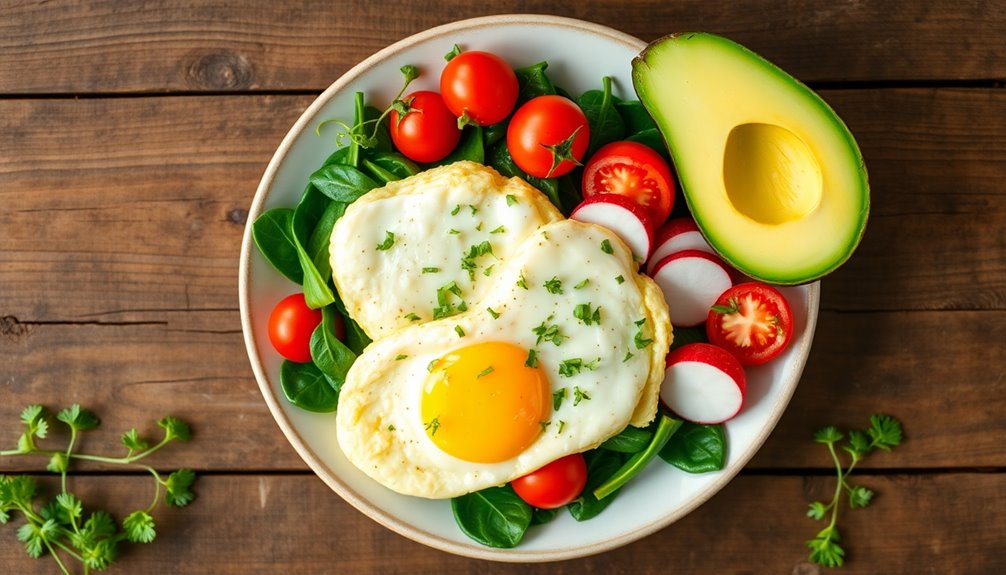An ovo-vegetarian diet includes eggs while excluding all other animal products. This diet offers complete protein and essential vitamins like B12 and D, making it nutrient-rich. You'll notice that eggs enhance plant-based foods, aiding in maintaining a balanced intake. Moreover, the diet promotes weight management and can reduce the risk of chronic diseases. To flourish, make sure you obtain sufficient protein from eggs and other sources, while keeping an eye on your nutrient levels. If you're interested in meal ideas and tips for making the switch, there are plenty of resources available to assist you.
Key Takeaways
- An ovo-vegetarian diet includes eggs while excluding all other animal products, providing a source of complete protein.
- It promotes health benefits such as lower risks of chronic diseases and aids in weight management through protein's satiating effects.
- Essential nutrients like B12, vitamin D, and choline are abundant in eggs, making them a valuable addition to a plant-based diet.
- Ovo-vegetarians can enjoy diverse meals, including omelets, frittatas, and quinoa salads, while incorporating legumes, whole grains, and colorful fruits and vegetables.
- Transitioning to ovo-vegetarianism can be gradual, allowing individuals to explore new recipes and build a supportive community.
What Is an Ovo-Vegetarian Diet?
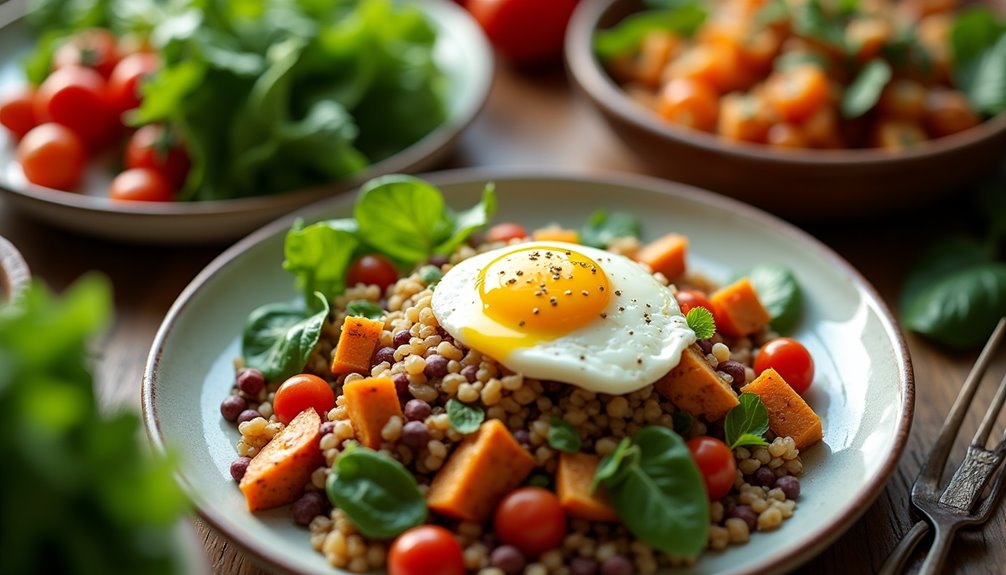
An ovo-vegetarian diet is a type of vegetarianism that includes eggs but excludes all other animal products, such as meat and dairy. This dietary choice can be an excellent way to enjoy the nutritional benefits of eggs while aligning with ethical or health considerations that lead you to avoid meat and dairy. By incorporating egg consumption into your meals, you'll gain access to a rich source of high-quality protein, which is essential for overall health.
Eggs are known for their complete protein profile, containing all nine essential amino acids your body needs. This makes them a valuable addition to your diet, especially if you're focusing on plant-based protein sources for the rest of your meals. While you may rely on legumes, nuts, seeds, and whole grains for protein, eggs can help fill any gaps and provide a versatile ingredient for various dishes.
Navigating an ovo-vegetarian lifestyle can feel inclusive, as you can still partake in many traditional meals that feature eggs. From breakfast scrambles to baked goods, the possibilities are endless. Additionally, following an ovo-vegetarian diet can offer significant health benefits, such as lower cholesterol levels and enhanced heart health.
It's also worth noting that egg consumption allows you to connect with others who share similar dietary choices, fostering a sense of community.
Ultimately, whether you're motivated by health, ethical reasons, or a desire to explore diverse cuisines, an ovo-vegetarian diet offers a flexible and satisfying approach to eating while embracing the benefits of both eggs and plant-based proteins.
Health Benefits of Ovo-Vegetarianism
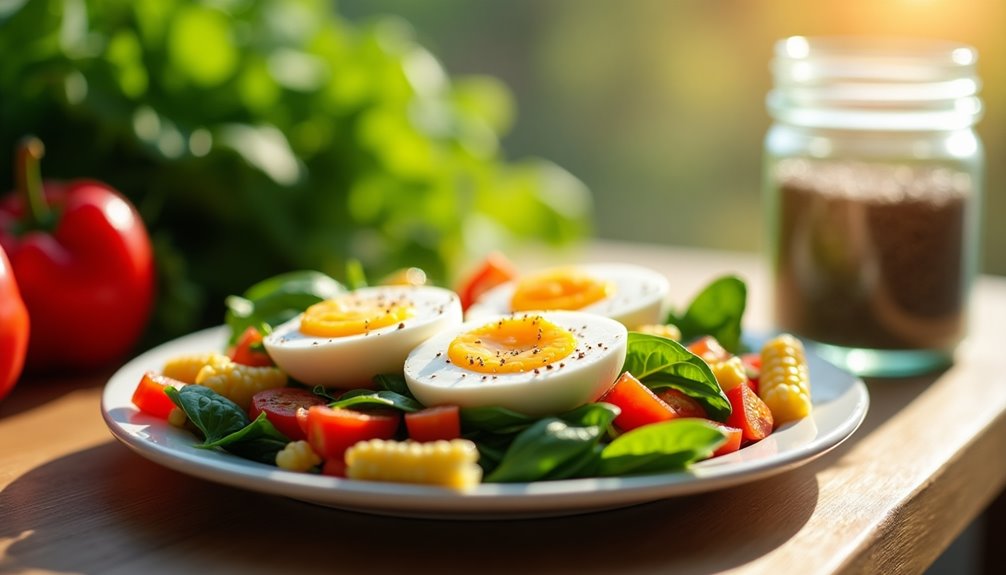
The ovo-vegetarian lifestyle offers numerous health benefits that can enhance your overall well-being. By including eggs in your diet while avoiding meat, you can enjoy a variety of positive effects on your health, environment, and ethical considerations.
Here are some key benefits of adopting an ovo-vegetarian diet:
- Weight management: Eggs are high in protein, which helps keep you full longer, making it easier to manage your weight.
- Disease prevention: A diet rich in vegetables and eggs can lower the risk of chronic diseases, such as heart disease and diabetes.
- Nutrient density: Eggs provide essential nutrients like vitamin D, B12, and choline, supporting your overall health.
- Environmental impact: By choosing an ovo-vegetarian lifestyle, you contribute to lower greenhouse gas emissions compared to meat-heavy diets, promoting a healthier planet.
- Ethical considerations: This diet allows you to enjoy animal products while minimizing harm to animals, aligning with a compassionate lifestyle.
Switching to an ovo-vegetarian diet can be a rewarding experience, both for your health and the world around you. You'll find that making these choices not only nurtures your body but also fosters a sense of belonging within a community that values health, sustainability, and ethical living. Additionally, incorporating plant-based protein into your meals can further enhance your nutritional intake and energy levels.
Embracing this lifestyle encourages you to connect with others who share similar values, making it a fulfilling journey towards better health and well-being. So, why not explore the benefits of ovo-vegetarianism and see how it can positively impact your life?
Nutritional Considerations
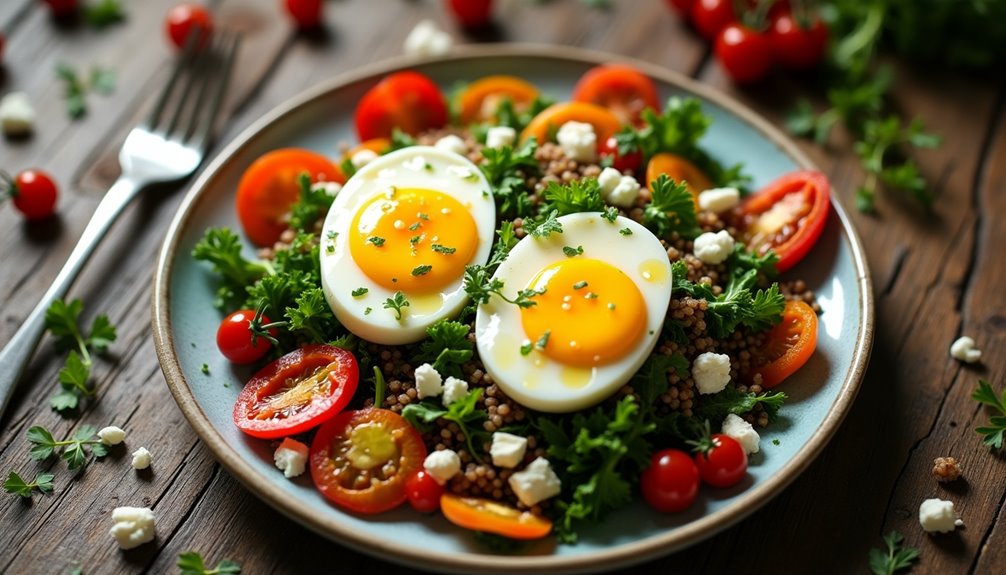
While adopting an ovo-vegetarian diet can offer many health benefits, it's crucial to pay attention to your nutritional intake to maintain a well-rounded diet. One of the key considerations is making sure you get enough protein. Eggs serve as an excellent protein source, but you'll also want to include a variety of plant-based proteins. Foods like legumes, nuts, seeds, and whole grains can help meet your protein needs and provide essential amino acids.
Another essential aspect of your diet is ensuring you're getting enough vitamins and minerals. B vitamins, particularly B12, can be a concern since they're primarily found in animal products. Although eggs contain some B12, you might still consider vitamin supplements to make sure you're meeting your daily requirements.
Additionally, keep an eye on your iron and calcium intake, as these nutrients can sometimes be lower in an ovo-vegetarian diet. Incorporating fortified foods or supplements can help bridge any nutritional gaps.
Don't forget about omega-3 fatty acids, which are important for heart health. While they're often found in fish, you can explore options like flaxseeds, chia seeds, and walnuts to enhance your diet. Following a plant-based diet can also contribute to your overall health and wellness while reducing your environmental impact.
Foods to Include
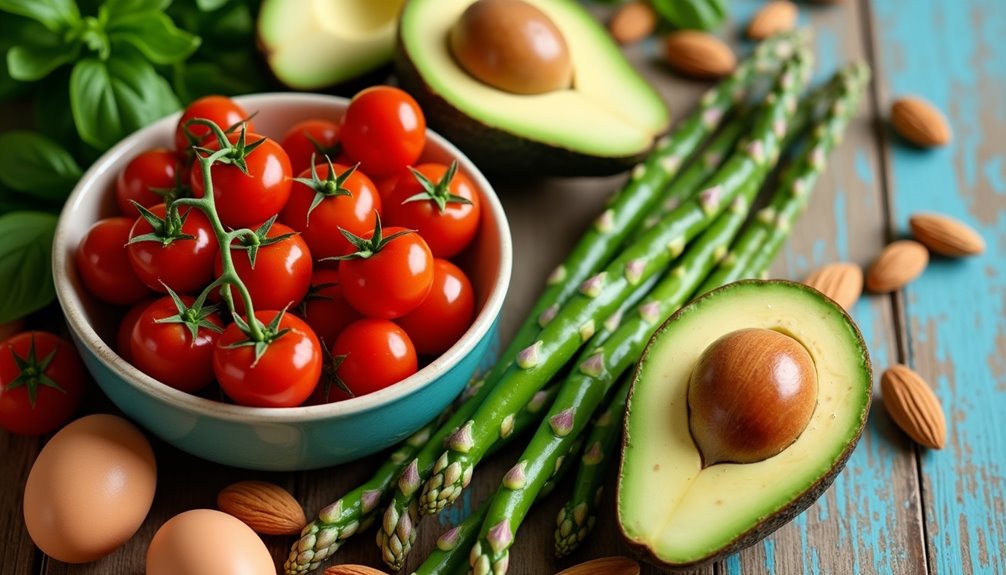
When planning your ovo-vegetarian diet, it's crucial to include a variety of foods that provide essential nutrients. This way, you can enjoy a balanced intake of vitamins, minerals, and protein while feeling satisfied and nourished. To help you get started, here are some foods that should definitely be on your shopping list:
- Legumes: Beans, lentils, and chickpeas are excellent protein sources, helping you meet your daily protein requirements while offering fiber and other crucial nutrients.
- Whole grains: Quinoa, brown rice, and whole wheat bread not only provide energy but also contain essential amino acids, making them a great addition to your meals.
- Fruits and vegetables: Variety is key! Aim for colorful produce to make sure you get a range of vitamins and minerals. Leafy greens, berries, and root vegetables are all fantastic choices.
- Dairy products: If you consume dairy, yogurt, cheese, and milk can provide additional protein sources and calcium for strong bones.
- Egg substitutes: If you're looking for alternatives to eggs, consider options like tofu or flaxseed meal, which can be used in baking or cooking to help bind ingredients together. Incorporating mini bands into your workout routine can also help enhance your overall health and fitness while following this diet.
Foods to Avoid
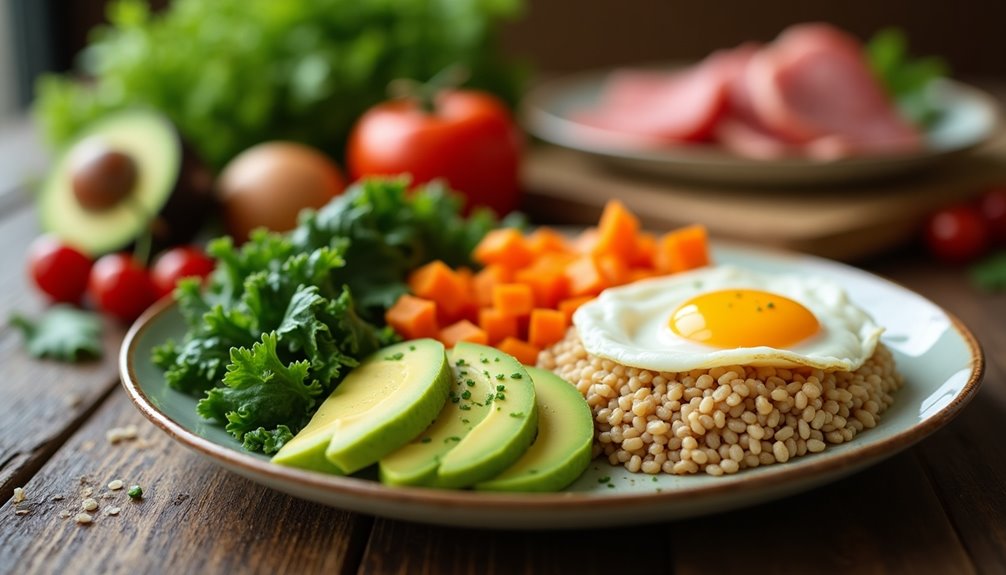
To maintain a healthy ovo-vegetarian diet, it's important to steer clear of certain foods that can undermine your nutritional goals. While you're focusing on including wholesome plant-based foods and eggs, be aware of items that may contain hidden animal byproducts. For instance, some processed snacks, baked goods, and sauces may use gelatin, which is derived from animal bones and skin. Always read labels carefully to avoid these sneaky ingredients.
Additionally, while dairy alternatives can be a great substitute, not all are created equal. Some dairy alternatives, like certain brands of soy or almond milk, may be loaded with added sugars and unhealthy fats. Opt for unsweetened varieties whenever possible.
It's also a good idea to avoid highly processed foods that contain preservatives, artificial ingredients, or excessive sodium. These not only lack nutritional value but can also lead to cravings and unhealthy eating patterns.
Moreover, steer clear of meat products, of course. This includes not just obvious meats but also things like broths or stocks made from animal parts. When you choose eggs, make sure they come from a reputable source that practices humane treatment of hens. Furthermore, be mindful that some gluten-free products can lead to weight gain and insulin resistance, mirroring the negative effects of traditional bread on your health.
Meal Planning Tips

Meal planning for an ovo-vegetarian diet can be both enjoyable and rewarding, helping you stay organized while ensuring you get the nutrients you need. By incorporating a variety of foods and cooking techniques, you can create balanced meals that satisfy your taste buds and nutritional requirements.
To get you started, here are some essential tips for effective meal planning:
- Diverse protein sources: Include eggs, dairy, legumes, nuts, and seeds to boost your protein intake.
- Batch cooking: Prepare larger portions of meals to save time during busy weekdays.
- Mix cooking techniques: Experiment with boiling, roasting, sautéing, and steaming to keep your meals interesting and flavorful.
- Seasonal produce: Choose fruits and vegetables that are in season for the freshest flavors and nutrients.
- Plan for snacks: Keep healthy snacks on hand, like hummus and veggies or yogurt and fruit, to curb hunger between meals.
- Incorporating healthy recipes can also provide inspiration and variety to your meal planning routine.
Recipes for Inspiration
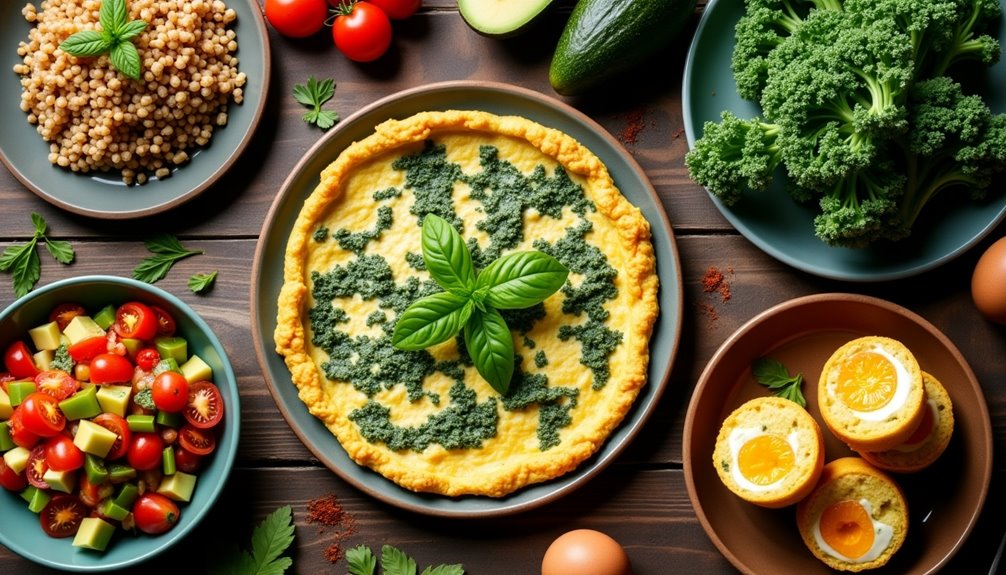
Incorporating delicious and nutritious recipes into your ovo-vegetarian meal plan can inspire creativity in the kitchen while providing you with the essential nutrients your body needs. With a focus on egg alternatives and dairy options, you can create meals that aren't only satisfying but also packed with flavor.
Start your day with a vibrant vegetable omelet, using eggs as your protein base. You can mix in spinach, tomatoes, and bell peppers, and don't forget to add some cheese for that creamy touch.
If you're looking for egg alternatives, consider using silken tofu blended with nutritional yeast to create a fluffy scramble that's just as delightful.
For lunch, whip up a hearty quinoa salad featuring roasted chickpeas, diced cucumbers, and a tangy lemon-dill dressing. This dish offers a fantastic source of protein and fiber, ensuring you stay full and energized. You can also include some feta or goat cheese to enhance the taste.
Dinner can be a cozy affair with a comforting frittata, where you can throw in your favorite seasonal vegetables and herbs. Pair it with a side of roasted sweet potatoes for added nutrients and flavor.
Finally, satisfy your sweet tooth with a banana and oat pancake recipe that uses eggs and a splash of milk. This simple dish can be topped with fresh fruits and a drizzle of honey or maple syrup for a delightful treat. Incorporating a variety of flavors and textures in your meals can enhance your overall Keto diet journey while keeping your meals exciting.
Experimenting with these recipes not only nourishes your body but also fosters a sense of community as you share them with family and friends.
Common Misconceptions
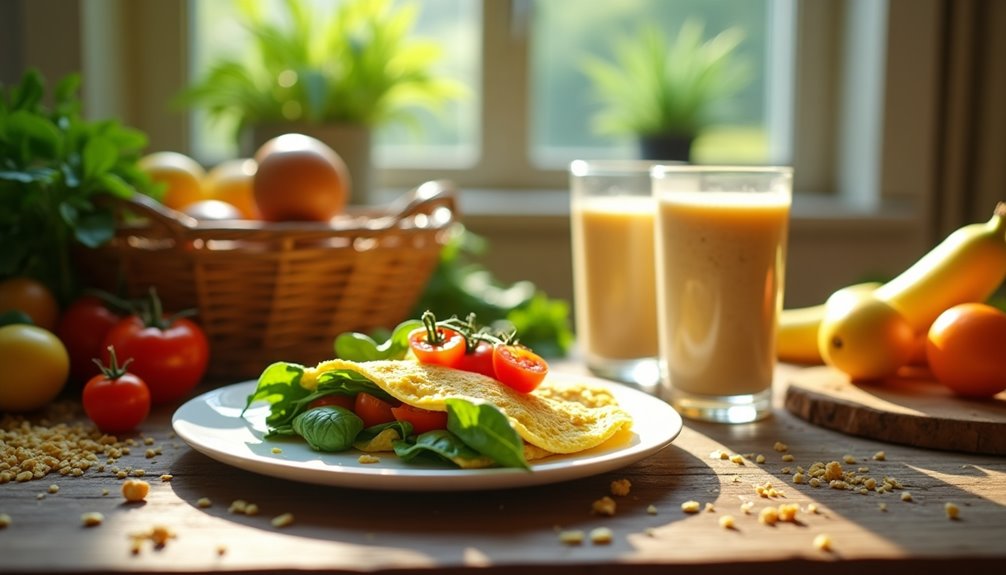
Many people hold misconceptions about the ovo-vegetarian diet, often believing it lacks essential nutrients or is overly restrictive. In reality, this diet can provide a balanced array of nutrients, especially when you include a variety of foods. One common myth is that ovo-vegetarians don't get enough protein. In fact, there are numerous protein sources available, including: – Eggs: A fantastic source of complete protein and essential amino acids. – Legumes: Beans, lentils, and chickpeas are nutrient-dense and protein-rich. – Dairy: If included, dairy products like yogurt and cheese can boost your protein intake. – Nuts and seeds: Almonds, chia seeds, and hemp seeds provide healthy fats and protein. – Whole grains: Quinoa and farro are excellent plant-based protein sources.
Moreover, it is important to recognize that dietary choices can play a significant role in managing health conditions like CKD. Another misconception is that egg consumption is unhealthy. While it's true that moderation is key, eggs can be part of a healthy diet. They're packed with vitamins, minerals, and healthy fats, making them a versatile ingredient in many recipes.
Additionally, some people think that ovo-vegetarianism limits your food options to bland dishes. On the contrary, the flexibility of incorporating eggs allows for diverse and flavorful meals. By embracing the richness of this diet, you can enjoy a wide range of cuisines while maintaining a healthy lifestyle. Remember, it's all about balance and variety to [ENSURE] you're meeting your nutritional needs while enjoying the benefits of an ovo-vegetarian diet.
Transitioning to Ovo-Vegetarianism
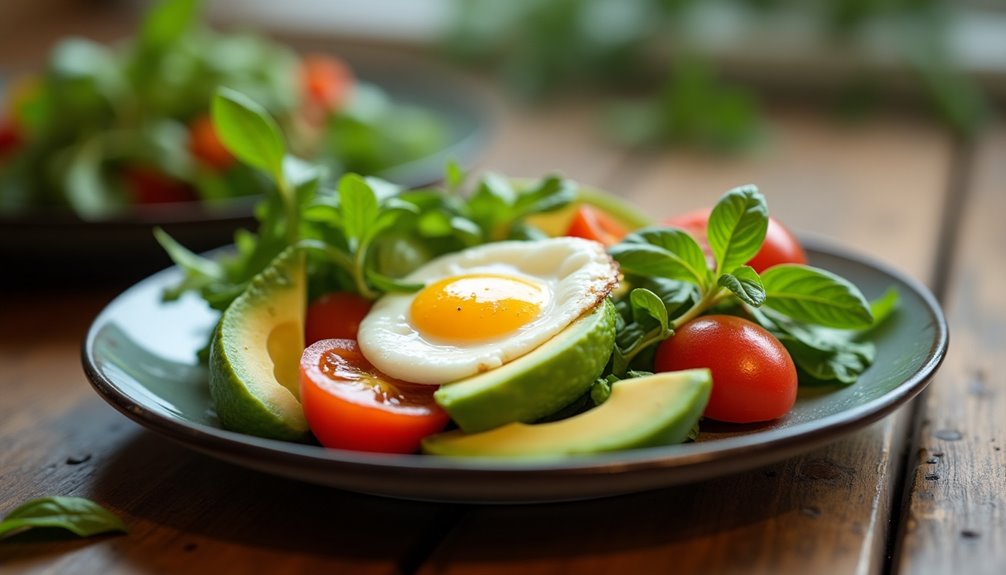
Embarking on an ovo-vegetarian diet can be a fulfilling journey toward healthier eating habits. To make this shift smoother, consider incorporating gradual changes to your meals. Begin by adding more plant-based foods to your diet while swapping eggs as your primary protein source. This approach not only helps ease the change but also allows your taste buds to adapt over time.
You'll discover a plethora of recipe resources online that cater specifically to ovo-vegetarian diets. These can assist you in exploring delectable alternatives that are gratifying and nourishing. From hearty vegetable frittatas to chickpea salads topped with a poached egg, the possibilities are limitless. Trying out different cuisines can keep your meals interesting and varied.
Building a support system can also enhance your transition. Join online forums or local groups where you can exchange experiences and tips with others who are on a similar path. This sense of community can offer motivation and responsibility, making the journey feel less intimidating.
Do not underestimate the significance of protein sources, especially as you eliminate meat. Eggs, legumes, dairy, and nuts can provide sufficient protein to keep you energized. Understanding how to balance your meals will guarantee you're meeting your nutritional requirements. Additionally, considering the benefits of a comprehensive program can further support your dietary transition and overall health.
Frequently Asked Questions
Can Ovo-Vegetarians Eat Processed Foods?
Yes, you can eat processed foods, but it's wise to check the labels. Many processed items contain food additives that mightn't align with your dietary preferences. While some processed foods offer convenience, they often lack nutritional value compared to whole foods.
Balancing your diet with fresh fruits, vegetables, and whole grains guarantees you receive the nutrients you require. Embracing both can help you feel satisfied and connected to a broader community.
How Does Ovo-Vegetarianism Compare to Veganism?
When comparing ovo-vegetarianism to veganism, you'll find notable nutritional differences.
Ovo-vegetarians consume eggs, which provide protein and essential nutrients lacking in a strict vegan diet.
Ethical considerations also come into play, as vegans avoid all animal products, prioritizing animal welfare.
Health implications vary; both diets can promote well-being, but you'll need to ensure balanced nutrition.
Are There Any Environmental Benefits to Ovo-Vegetarianism?
When you choose a diet that emphasizes ethical sourcing and sustainable agriculture, you're contributing to reduced environmental impact.
For example, a study showed that farms practicing sustainable methods can lower greenhouse gas emissions by up to 30%.
By incorporating more plant-based foods and responsibly sourced eggs, you're not only supporting animal welfare but also fostering biodiversity.
Adopting this lifestyle can lead to healthier ecosystems and a more sustainable food system for everyone.
Is It Safe for Children to Follow an Ovo-Vegetarian Diet?
It's safe for children to follow a well-planned diet, but there are nutritional concerns to keep in mind.
You'll want to make sure they get enough protein, iron, and essential vitamins. Meal planning becomes important; include a variety of foods like eggs, dairy, legumes, and whole grains.
Consulting a healthcare provider or a nutritionist can assist you in creating balanced meals that support your child's growth and development while embracing a vegetarian lifestyle.
How Does Ovo-Vegetarianism Affect Athletic Performance?
Athletic performance can flourish on a well-planned diet abundant in protein sources and nutritional balance. If you're an athlete, concentrating on eggs and dairy can offer essential amino acids for muscle repair and growth.
Including a variety of vegetables, legumes, and whole grains secures you receive the vitamins and minerals necessary for energy and recovery. Just keep an eye on your intake to uphold balance, and you'll bolster your performance effectively!
Conclusion
To sum up, embracing an ovo-vegetarian diet might just be the perfect way to enjoy eggs without the guilt of consuming meat—after all, who knew that avoiding bacon could be such a delicious adventure? With its numerous health benefits and flavorful options, you might find yourself wondering why you didn't make the switch sooner. So, whether you're in it for the health perks or just love a good frittata, this diet could be your egg-citing new journey!

